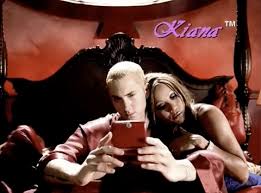

His divorce from Kim Mathers fuels the slow Southern bounce of the hypermisogynist “Superman,” and his relationship with his estranged mother creates “Cleanin Out My Closet,” possibly the record’s most powerful moment. Predictably, the three women in Eminem’s life figure big on The Eminem Show. “Say Goodbye Hollywood” is the standard mo’ money, mo’ problems fare given new life “Drips” is hip-hop’s most poignant visit to the STD clinic since Ice Cube’s 1991 song “Look Who’s Burnin’.” Dre against Jermaine Dupri on “Say What You Say.” On “Business,” Em names himself the gatekeeper of hip-hop and obliquely claims to be the best rapper alive: “The flow’s too wet/Nobody close to it/Nobody says it, but everybody knows the shit.” His way with words and his sheer honesty can make topics that would otherwise seem so last week sound new. He’s moved on from dissing Everlast and Britney Spears and is unafraid to take on credible black MCs now, dissing Canibus on “Square Dance” and egging on Dr. On the rock-fueled “White America,” he confesses that “if I was black, I woulda sold half.” But even as he remains acutely aware of his position as a big-time white rapper, Eminem fully enters the fray of mainstream hip-hop on The Eminem Show. Dre’s three contributions (“Business,” “Say What You Say,” “My Dad’s Gone Crazy”) are hard to pick out without production credits. He’s learned so much so well as a producer that Dr. “Soldier” and ” ‘Till I Collapse” are all paranoid horror-movie instrumentation bottomed with arena-rock grandeur.

Every track has some sort of melodic edge songs such as “White America” and “Cleanin Out My Closet” feature electric-guitar rhythms fraternizing with hip-hop-sensible drum patterns. But as always, Em’s most potent weapon is his ability to counter his critics by accepting his vulnerabilities and turning them into song fodder.Įm produced or co-produced most of the album, and he’s quickly becoming an expert beatmaker. “To do black music so selfishly/And use it to get myself wealthy.” He’s being a little harsh on himself: After all, the only white folks really doing white music are strumming harps and blowing bagpipes. “I am the worst thing since Elvis Presley,” he raps. On The Eminem Show, Eminem is no longer pulling the race card just for laughs. “If y’all leave me alone, this wouldn’t be my M.O.,” he says on “My Dad’s Gone Crazy.” This time he’s rapping because the world has pissed him off, not the other way around. But Em isn’t saying things just to get you mad here. “Without Me” - like his “The Real Slim Shady,” the leadoff single from 2000’s The Marshall Mathers LP - is a fun-loving, barb-laden romp on which he flits from one topic to the next like a bumblebee with ADD. The Eminem Show has the self-assurance of an artist at the top of his game and the game, the understanding that the music world is hanging on his every word and the willingness to shock even the most jaded ears.Īppropriately enough for a man closing in on thirty, The Eminem Show finds Eminem more mature and focused, if not kinder and gentler. And that’s not only because he reworks Aerosmith’s “Dream On,” on “Sing for the Moment.” The Eminem Show is a hybrid theory of Jay-Z’s hyperconfident The Blueprint, Staind’s pained Dysfunction and Tupac’s anti-hero masterpiece All Eyez On Me.

With The Eminem Show, Eminem just may have made the best rap-rock album in history.


 0 kommentar(er)
0 kommentar(er)
